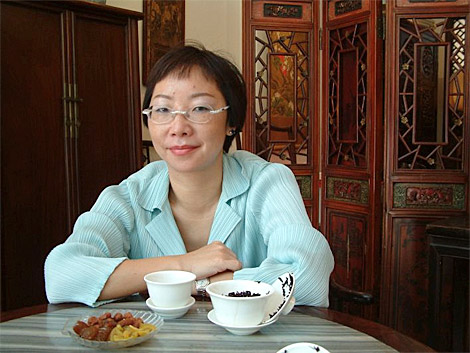
(注:王慧恩(Vicky Wong)出生于香港,2001年创建了乐华智才(EPC Consulting)。这是一家面向中国的高级管理人员招聘与人力资源公司,拥有32名雇员,在香港、广州、上海和北京均设有办事处。)
*我在香港工作,但每周会花两天时间在广州。我乘坐早上8:18分香港-广州的特快列车。因为拥有香港身份证与中国归国人员证,我可以在仅仅10分钟内通过两边的入境检查站。但由于广州即将举办亚运会,火车上人满为患。
*一到广州,我就会和广州办事处的14名职员开会,评估项目与客户。广州是我们的研究基地,但我们正考虑在深圳开设一间新办公室,那里有更多客户要我们帮他们招聘员工。
*我们最近在帮两家公司搜寻两位高管,所以,两位高级经理向我汇报了他们对候选人的调查以及总体的市场状况。我们必须为一家拍卖行寻找一位20世纪中国绘画专家,为一家中国投行的中国房地产基金物色一位董事总经理。
*跟着,我赶往距离我们办公室两个街区的粤式点心店利苑,去见我们在大陆的合作伙伴徐加莉。徐加莉在广州非常有影响力,我们所有的政府关系、牌照与劳工问题都由她负责处理。我们讨论了亚运会将如何影响广州在国际舞台上的地位,沃伦•巴菲特(Warren Buffett)-比尔•盖茨(Bill Gates)之行将如何推动中国慈善活动发展。
*我们的优势在艺术、石油与能源业,以及准备走出国门的中国公司。我们已经为中国绘画专家的职位忙了两个月,研究了香港、台湾、内地及海外拍卖业、美术馆与博物馆的主要竞争者。
*我今天已经在电话面试了一位候选人。重要候选人的面试要花1到2个小时的时间。
*对任何空缺职位,我们都是先调查然后接洽候选人。如果可能的话,我更喜欢面对面或者电话接洽。电子邮件是单向性的,通常无法让人感受到人性化的一面和工作积极性。
*语言要求会有差异。英语和普通话是选择驻华高管的两个重要条件。我通常用英语面试。普通话是中国的工作语言,但如果候选人拥有某套专业技能或管理技能,我们可以忽视语言方面的不足。我们安置的候选人中,大约35%来自亚太地区(香港、新加坡、马来西亚、台湾),60%来自中国内地。约5%来自西方国家。
*然后我给一家客户打了电话。他们正在寻找一位有化工涂料经验的高管。我试图说服他们,考虑一下其它化工相关行业的候选人,因为没有足够的技术人才可以填补他们的空缺职位。否则,他们就要等上半年到1年,才能填补空缺。
*最后,我去参加了与华南美国商会(American Chamber of Commerce of South China)的会谈,讨论我们共同赞助的人力资源培训项目。在富士康(Foxconn)与本田(Honda)争议事件之后,促进工作场所的和谐,已经成为了优先事务。我们向华南地区的跨国与中资公司,提供最低工资、劳动法最新变动、福利、雇主品牌建设、职业发展与工作环境等问题的建议。
*通常,员工罢工不仅仅是为了钱,他们是想从管理层那里寻求关注与安全感。
译者/何黎
http://www.ftchinese.com/story/001035643

Hong Kong-born Vicky Wong founded EPC Consulting, a China-focused executive recruitment and human resources company, in 2001. EPC has 32 employees spread over four offices in Hong Kong, Guangzhou, Shanghai and Beijing.
I’m based in Hong Kong, but I spend two days a week in Guangzhou. I take the 8:18am Hong Kong-Guangzhou Express Train. With my Hong Kong identity card and China returnee card, I can go through both sides of the immigration in just 10 minutes. But because of the forthcoming Asian Games in Guangzhou, the train is quite full.
As soon as I arrive in Guangzhou, I meet the 14 staff members in our office to review projects and clients. Guangzhou is our research base but we discuss opening a new office in Shenzhen, where more clients are asking us to help them recruit employees.
Two of my senior managers report on their research on candidates and the market in general in connection with two recent executive searches. We had to find a specialist in 20th century Chinese painting for an auction house, and a managing director for a China property fund for a Chinese investment bank.
Head off to Lei Yuan, a Cantonese dim sum restaurant two blocks away from the office, to meet Xu Jiali, our Chinese partner. Ms Xu is very influential in Guangzhou and handles all our government relations, licensing and labour issues. We discuss how the Asia Games will put Guangzhou on the international map and how philanthropy has received a boost after the Warren Buffett-Bill Gates trip.
Our strengths are in the art, oil and energy industries, and Chinese companies going abroad. We have been working on the Chinese art specialist roles for two months. We looked at the key competitors in the auction field, galleries and museums across Hong Kong, Taiwan, the mainland, and overseas as well.
I’ve already intervieweda candidate on the phone today. Serious candidates take between one and two hours.
For any opening, we research and approach the candidates. I prefer to approach them in person or by phone if possible. E-mail is one-way and often does not give a feel for the human side and motivation.
Language requirements vary. English and Mandarin are two important criteria for senior executives in China. I usually conduct the interviews in English. Mandarin is the working language in China, but if the candidate has a certain technical skill set or management expertise, that can outweigh the language limitations. About 35 per cent of the candidates we place are from greater Asia – Hong Kong, Singapore, Malaysia, Taiwan – and 60 per cent are from mainland China. About 5 per cent are westerners.
I phone one of our clients who is looking for an executive with experience in chemical coating. I try to convince them to consider candidates from other chemical-related industries, as there are not enough skilled people to fill the jobs available. Otherwise, clients can wait six months to a year to fill vacancies.
Attend a meeting with the American Chamber of Commerce of South China to discuss our jointly-sponsored HR training programme. After the Foxconn and Honda controversies, establishing harmony in the workplace has become a priority. We offer advice to multinational and Chinese companies in South China on issues such as minimum wages, labour law updates, benefits, employer branding, career development and working conditions.
Often, it’s not just about the money when staff go on a strike – they are looking for attention and a sense of security from management.
没有评论:
发表评论